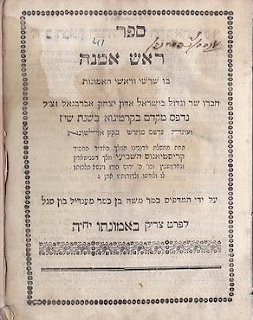 |
| Ateret Zekeinim (Crown of the Elders): Abravanel's first main work defending the negative image of the biblical elders. |
Part 1
Introduction
There is a
fundamental difference of opinion between Maimonides (Rambam, 1135-1204) and
Abravanel (1437-1508) as to who is entitled to lead the Jewish people.
According to Rambam, it is Moshe (or the relative equivalent in subsequent
generations, which we shall refer to as the “rabbis”); and according to
Abravanel, it is the representatives of the people (which we shall refer to as
the “elders”).
This article is based extensively on the research by Cedric Cohen-Skalli[1] although the adaptation of this debate to modern times is my own.


